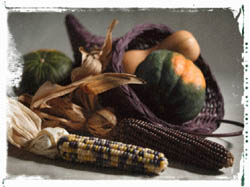 A few days ago I was sitting at my kitchen table working out my study schedule for the next few weeks. In planning for Monday October 13th I commented off-handedly about my classes. My wife looked at me oddly and said that I didn’t have any classes that day because of Thanksgiving. I told her that no one had mentioned anything of the like at the university and that I was pretty sure that classes would be held. As happens more often than not, she was proven correct when I checked the university schedule over the Internet.
A few days ago I was sitting at my kitchen table working out my study schedule for the next few weeks. In planning for Monday October 13th I commented off-handedly about my classes. My wife looked at me oddly and said that I didn’t have any classes that day because of Thanksgiving. I told her that no one had mentioned anything of the like at the university and that I was pretty sure that classes would be held. As happens more often than not, she was proven correct when I checked the university schedule over the Internet.
To some it might seem odd that I didn’t know that educational institutions are automatically closed on statutory holidays. But after over twenty years in the workforce, the last fifteen in the railway industry, the fact seems odd to me. The railway, like many other industries in our contemporary world, maintains twenty-four-hours-per-day, seven-days-per-week operations. Trains don’t stop running on holidays (except possibly Christmas/New Years days, if management so chooses), so statutory holidays became as any other day to me”?ones upon which I was subject to work, and for which I would receive premium pay. The thought of actually having a statutory holiday off as a day of rest didn’t often enter my mind.
I have a brain that tends to chew over facts that others might think insignificant and ever since the conversation with my spouse, I have been bothered by the fact that I never really knew or understood the nascent locus of the Thanksgiving holiday—who adopted it, where, and why. Although pressures on my time are immense due to study-load, I knew my mind would not let the subject rest until I had looked into it. Here is what I discovered in my necessarily brief exploration into Thanksgiving Day:
Thanksgiving was first officially celebrated in seventeenth century New England. The Pilgrims (early English settlers; the founders of Plymouth Colony) and local Native Americans annually came together in celebration of the autumn harvest. It is likely that the roots of the celebration predate English North Americans and evolved from ancient European harvest festivals. In any case, contemporary Thanksgiving celebrations are only loosely related to agrarian harvests and are more familial-centered; focusing on the family, home, and of course food. The victuals around which the family gathering is centered make up the bulk of my childhood memories of Thanksgiving”?the Thanksgiving “feast”.
Traditional fare might include turkey and its stuffing, cranberry sauce, squash, sweet-potatoes, mashed potatoes, gravy, and pumpkin pie for dessert. It is not surprising that traditional thanksgiving edibles represent local foods that the Pilgrims would have found in plenty upon their arrival to the “new world”. I find it odd that Americans celebrate thanksgiving on the fourth Thursday in November, while Canadians celebrate it on the second Tuesday in October. Could it be that Canada, being north of the U.S., experiences autumn, and by extension its harvest, earlier in the year:?
In any case, my limited research into the holiday has enlightened me and my ever-churning mind can now move onto its next inquiries. However, the mere fact that the university is closed on October 13th does not ensure that I will experience thanksgiving as most other North Americans do. I expect that I’ll be partaking of a cornucopia, but it won’t be one overflowing with the edible bounty of a successful fall harvest; rather, it will consist of the never-ending evolutionary litany of the Canadian common law”—cases, cases, and more cases:
Wayne E. Benedict has a varied career history and strong links to the Canadian labour movement. He is working part-time toward his Bachelor of Human Resources and Labour Relations at Athabasca University. He is a fulltime first-year student of the University of Saskatchewan College of Law. For a more detailed writer bio, see The Voice writers’ feature page in “about the Voice”. If you would like to send article-feedback to Wayne, he can be reached at wayneben@sasktel.net


